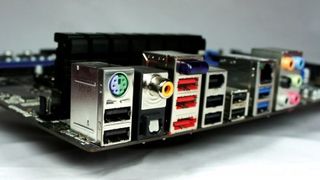We're going to gloss over the processor, motherboard and GPU. If you opted for a mid- to low-end processor then there are often upgrade options within the same available socket. These options reduce as time goes by and any new sockets may have superseded whatever you currently have.
Often a dual CPU and motherboard upgrade gives you the real jump in processing power you're looking for, but then the expense at this point is starting to creep up. You should also consider a power supply upgrade. This might sound an odd suggestion - as it's not going to improve performance a jot - but it could greatly improve energy efficiency of your old machine.
Having recently tested the ultra-efficient Pico PSU from Scan Computers - alongside newer and older PSUs - it quickly became obvious that newer units are far more efficient than older ones. If you're running an old PSU that's not certified at least bronze in efficiency, then consider an upgrade to save on 10 - or as much as 30 - per cent power use. It's a worthwhile investment as a PSU is one thing that will last and last.
Coffin dodger

You can, of course, simply give your system away. With extended families there always seems to be somebody that's in need of a PC, be it a desktop or a laptop. It's more than likely that whoever it is will be more than happy with your cast-off.
This isn't to say you should go handing over your previously prized possession. We'd be strong advocates of a full format and Windows reinstall. It's not only far more pleasant giving someone a vanilla Windows install, but you won't be lying there at night worrying about your browsing history being uncovered.
When handing over a system it's well worth going through a short checklist of items, so below we have 'Destroy the evidence' on wiping data and good practice when doing that. We also hope you're handing over your Windows licence and original discs too, if there's a recovery partition or disc then it's best to use this and hand these over as well.
A common issue with older laptops, however, is the old dead battery - if you're handing one to a relative you might want to discuss if they need the battery or not. Replacements can usually be acquired more cheaply from eBay, if they feel they need the portability. Unfortunately, doing the donation thing usually entails a level of support, so prepare for the phone calls.
Get daily insight, inspiration and deals in your inbox
Get the hottest deals available in your inbox plus news, reviews, opinion, analysis and more from the TechRadar team.
If you're planning to use an old system for another job there are a few things to consider beforehand. First, you should give it a good spring clean. Grab yourself an air blaster, or a hoover with soft-brush attachment and a duster. Get inside that PC and make sure you clear off however many years of accumulated dust and dirt you find. We're told by good authority - namely QI - that most of that dust isn't human flesh. So that's at least one less icky worry removed.
Part of the reason for this is it's likely this old system is living on borrowed time - so it's important you clean up the CPU cooler, PSU fans and any system cooling of dust, to try and give it a fighting chance of living to see England fail to qualify for the next World Cup.
This brings us onto the important aspect of hard drive failure. It's just something to keep in mind that most hard drives have a three-year life expectancy, beyond that failure could happen at any point. Now, we're running drives six years old without issues, but we've relegated those to test systems. If they go and all the data is lost, that's fine. The point is, we'd advise you not to store anything vitally important on there in the long run.
Most Popular

